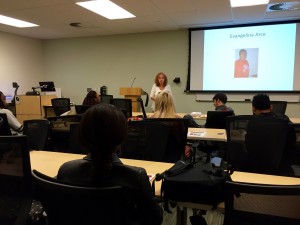Poetry is an alluring way to write about the raw human emotions that exist in each of our lives. They are simply timeless because they can apply to all individuals, as there is likely to be at least one poem that speaks to every person, or that they can relate to. On March 30th and 31st, Montgomery College welcomed Alicia Partnoy to the Rockville Campus. She had been invited to teach a master class on translation and to read her poetry, along with her mother, Raquel Partnoy, and her daughter, Ruth Irupe Sanabria. Potomac Review interns Safia Msami and Amber Sample write about the events below:
Translations, The Disappeared, Political Poetry

After settling in with some treats that accompanied the afternoon, the students in the master class focused on the idea of translating while still communicating and maintaining the same message to all individuals without losing the emotion behind each word. During this session we listened to Partnoy read from her autobiographical novel The Little School: Tales of Disappearance and Survival and Flowering Fires/Fuegos Florales, a published collection of her poetry. We also listened as she spoke about her past experiences as a political prisoner, and the travesty that Argentines faced during the military coup between 1974 through 1983. She showed us how her experiences of and feelings about this time in history are incorporated in each of her poems. It was during this session where we learned about the opposing terms of solidarity, or rather sol-i-dar-i-dad as Partnoy broke the word down in Spanish, and femicide. According to Partnoy, solidarity is a unity among individuals with a common interest; it is what binds mankind, and without it, humanity fades. Femicide, in stark contrast, is the act of killing women, a harsh way of separating individuals from their loved ones.
This was where Partnoy introduced us to Mexican poet Evangelina Arce, a strong woman and mother

devoted to finding her daughter, Silvia Arce, one of many women that have been disappeared in Mexico. Partnoy met Arce in Ciudad Juarez, Mexico, where dozens of female poets occupied the center of the mall and shouted out their heartfelt poems. During the class, Partnoy shared some of Arce’s poems, such as “Who Were These Women” and “I Search for You,” and discussed both the struggle and the importance of translating poetry. It was through translating one of Arce’s poems that students also learned how difficult the task is and just how different even one sentence can be between two languages.
Translation does its best to share the same emotional message as well as recreate the same poetic structure across languages so that it may be understood by and just as moving to all individuals, thus resulting in solidarity in that the poetry may unite its readers. Poetry allows for readers to acquire a sense of freedom through the meanings they attribute to the words from their own schema of the world and their experiences. The translation of poetry or any literary work allows for the message beneath each word to remain, while igniting emotions that will remain with the reader and become permanent in their heart. The message all writing is meant to send should resonate with the readers and leave the same impression in any other language, as it does in the language it was originally written.
Three Generations of Latin American Women

The following evening’s program featured three women: Partnoy, her mother, artist Raquel Portnoy, and daughter, writer and English teacher Ruth Irupe Sanabria. Each woman spoke before the crowd, smiling with a strength and grace that brightened the beautiful night that seemed to pass by too quickly, leaving the crowd longing for more. Each woman also shared the history of the Dirty War in Argentina, but each with their own unique experience of it; Partnoy, being taken from her home and made prisoner; Raquel Partnoy searching her daughter’s neighboring homes for her thirteen- month -old granddaughter, and baby Ruth suddenly without her mother. After Partnoy’s release from prison two- and -a- half years later, all three women were at last reunited in America where they would begin their journey for social justice through the passion of sharing art and telling their stories for the survival of others. During the assembly, all three women shared this passion through poetry readings and with the running slideshow of Raquel’s expressive paintings. These powerful women had much to share with us about their experience of the Argentine injustice.

The crowd learned quickly how strong these survivors are who fight for those who have no voice, and who help voices be heard like that of Evangelina Arce. Partnoy’s care and compassion reaches far, which became evident when she told the story of the reporter in Mexico who wanted to interview Partnoy, who had become a known figure by then, but could have not cared less about Evangelina Arce, a random Mexican woman whose daughter was disappeared. Sanabria’s passion showed when she read from her poetry, throwing her heart and emotions into her voice and making the words come alive. Finally, Raquel Partnoy’s paintings were evocative and beautiful to behold. Though a central meaning may not have always been clear, the detail and images clearly portrayed that the hand that had held the brush had been connected to a woman that poured her heart out
When the evening was coming to a close, Partnoy smiled and said, “Fighting is not glamorous. It is threatening.” Each day Partnoy and her family fight for justice and awareness through their art because they are strong enough to share their stories and their pain. Such a fight truly is a long and tiring ride filled with that pain from the past, but by embracing it, one can change the life of another.
